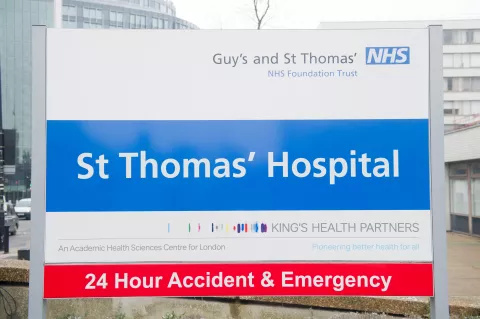New HIV testing in A&E will "save lives"
Monday 20 July 2015

A proactive new approach to HIV screening means that from today (Monday 20 July) patients in the Emergency Department (A&E) at St Thomas’ Hospital will be tested for HIV as part of routine blood tests.
In a move that will lead to earlier diagnosis and treatment, Guy’s and St Thomas’ is working on the basis that all Emergency Department patients having a blood test will be checked for HIV as standard practice. Every patient over the age of 16 who is already having their blood tested will be tested for HIV at the same time, unless they choose to opt out.
In 2014, 68,000 patients received blood tests while attending the Emergency Department at St Thomas’, one of the busiest in the country. It is expected that the routine HIV testing will identify more than 150 additional cases of patients with HIV each year.
Dr Nick Larbalestier, consultant physician and clinical lead for HIV at Guy’s and St Thomas’, says: “Normalising HIV testing will undoubtedly save lives. Just as we use blood tests to check for other medical conditions such as diabetes, we know that routine testing for HIV will identify undiagnosed cases.
“People with HIV are able to live long and healthy lives, but this depends on them being diagnosed promptly and receiving the specialist treatment they need. This is why it’s so important to increase detection rates.”
An estimated 107,800 people are living with HIV in the UK and of these 24% are undiagnosed. If people do not realise they have HIV they can unknowingly transmit it to others.
The prevalence of HIV in the area of south London served by Guy’s and St Thomas’ is the highest in the UK, with approximately 10 out of every 1,000 residents having the infection. This compares to an estimated national prevalence rate of around three out of every 1,000.
The Trust calculates that 40% of all newly diagnosed HIV inpatients have already had contact with its services in the previous 12 months, representing many missed opportunities for earlier diagnosis. After six months Guy’s and St Thomas’ will assess the new strategy’s success in supporting earlier diagnosis of patients with HIV.
HIV is a treatable medical condition and, by increasing the detection of undiagnosed cases, Guy’s and St Thomas’ can ensure that patients receive care and treatment from the Trust’s dedicated team of HIV specialists. Guy’s and St Thomas’ HIV service is among the largest in the UK.
Late diagnosis of HIV reduces the patient’s life expectancy and increases the risk of ongoing transmission. The cost of including HIV in the routine blood tests is less than £5 per patient but the cost of a late diagnosis is often considerable, in terms of both the patient’s health and unknowing onward HIV transmission. The lifetime cost of treating an individual living with HIV is around £300,000.
HIV therapy taken correctly controls the virus and allows the immune system to recover, dramatically reducing the risk of serious illness. HIV treatment has the added benefit of significantly reducing the risk of onward transmission.
Previous short-term pilot schemes in the NHS have demonstrated that routine HIV testing in the Emergency Department not only increases diagnosis of new HIV patients but also identifies individuals with HIV who require follow-up care.
Assuming that everyone may have been at risk of HIV and testing patients routinely are important steps in challenging the stigma that has sometimes been associated erroneously with the offer of an HIV test.
All patients will be given an information leaflet to explain why routine testing for HIV has been introduced. The results of the HIV test are usually available within 48 hours. All patients newly diagnosed with HIV will be contacted and asked to attend the hospital to confirm their initial diagnosis and to plan treatment.
Dr Michael Brady, Medical Director at Terrence Higgins Trust, says: "It's great to hear that Guy's and St Thomas' are starting routine HIV testing in their A&E department.
“Rates of undiagnosed HIV and late diagnosis remain unacceptably high in the UK and continue to contribute to preventable illness, death and onward transmission.
“I am sure this will only have a positive impact, especially in an area of such high HIV prevalence, and I hope that other hospitals will soon follow their lead."
Last updated: March 2022
Contact us
If you're a journalist and have a media enquiry, please contact us.
Phone: 020 7188 5577
Email: [email protected]